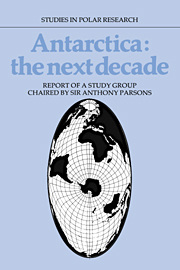Book contents
- Frontmatter
- Contents
- Acronyms
- The Study Group
- Preface
- Political map of Antarctica
- Geographical map of Antarctica
- Part I The Antarctic Treaty System under stress?
- Part II Uses of Antarctica
- 4 Science
- 5 Living resources and conservation
- 6 Mineral resources
- 7 Military potential
- Part III The future
- Appendices
- Notes and references
- Index
4 - Science
Published online by Cambridge University Press: 04 August 2010
- Frontmatter
- Contents
- Acronyms
- The Study Group
- Preface
- Political map of Antarctica
- Geographical map of Antarctica
- Part I The Antarctic Treaty System under stress?
- Part II Uses of Antarctica
- 4 Science
- 5 Living resources and conservation
- 6 Mineral resources
- 7 Military potential
- Part III The future
- Appendices
- Notes and references
- Index
Summary
The Antarctic amounts to nearly one-tenth of the land surface of our planet and a tenth of the world ocean. This significant geographical extent, if for no other reason, calls for research activities, but the general case is strengthened by the following considerations. It is the highest and coldest continent by virtue of its polar position, which results in all but 2 per cent of the land surface being covered by ice (over 4 km thick in places). It was the ‘keystone’ of the former supercontinent of Gondwana, and hence of great interest in terms of plate tectonics. As the strongest cooling centre of the global system it has importance for meteorological and climatic studies. Its isolation from the other continents by a wide and deep ocean is in part responsible for the fact that it is still relatively unaffected by man, and therefore provides a baseline for studies on global pollution of various kinds. Finally, a number of biological problems can be better studied there than anywhere else, and a vast, unplanned, long-term perturbation experiment caused by the over-exploitation of the southern stocks of whales provides further unique opportunities to study interactions within a marine ecosystem.
An additional advantage of the Antarctic for scientific research is the unparalleled political situation which exists there: the absence of national boundaries under the Antarctic Treaty helps to promote large-scale international co-operation in scientific programmes.
- Type
- Chapter
- Information
- Antarctica: The Next DecadeReport of a Group Study Chaired by Sir Anthony Parsons, pp. 47 - 63Publisher: Cambridge University PressPrint publication year: 1987

